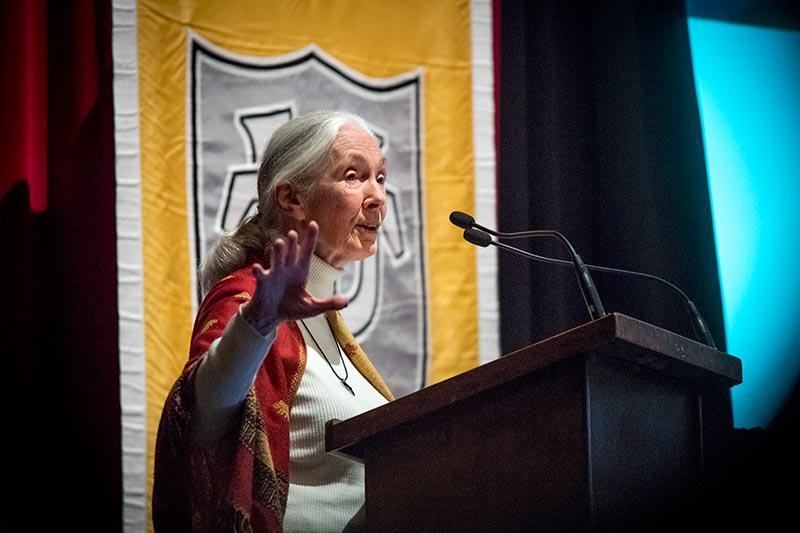Jane Goodall answers global crises with message of hope
Jane Goodall’s indomitable dedication to studying animal behavior began in an unlikely place — a henhouse. At 4 years old, Goodall crawled in after a hen on her family’s farm and waited for hours hoping to observe the bird laying an egg, taking her first step on a lifelong path of discovery.
“Isn’t that the making of a little scientist — asking questions, not getting answers and deciding to find out for yourself?” said the world-renowned conservationist, during a sold-out lecture in Dixon Hall on the Tulane University uptown campus.
Goodall spent the evening as both a storyteller, sharing tales of her life’s work, and as a scientist urging audience members to take action in preserving our planet for future generations.
“There’s nothing more amazing than being out in the rainforest and learning about how everything is connected; every little creature has a special part to play in the tapestry of life.”
Jane Goodall
Her childhood curiosity turned into the desire to travel to Africa to study the continent’s wildlife. That desire became a reality in 1960, when archaeologist Louis Leakey sent Goodall on an expedition to study the wild chimpanzees of Gombe Stream National Park in Tanzania.
Immersing herself within the animals’ habitat for months, Goodall made the groundbreaking discovery that chimpanzees make and use tools, forever changing scientific definitions of human and animal behavior.
During her discussion, Goodall also credited a conference that took place in Chicago 30 years ago for opening her eyes to the dangers faced by African chimpanzees, such as animal trafficking.
“I left as a different person. I left as an activist,” she said.
Her experience at the conference planted the seeds for her Roots and Shoots program. Established in 1991, the youth-led community action program flourishes in 130 countries, where children collaborate on projects aimed at bettering their world such as saving wild elephants and plotting school gardens.
Goodall now travels 300 days a year spreading a message of hope to communities facing environmental crises across the globe.
“Have we compromised the future of young people? You bet we have. But I think we have a window of time left to heal,” she said. “I hope that the New Orleans community will realize that every one of us has a role to play and everybody can make a difference.”
The event was presented by the Tulane Center for Public Service, Newcomb College Institute, Newcomb Tulane College, the School of Science and Engineering and the Tulane School of Liberal Arts.
Like this article? Keep reading: Famed conservationist Jane Goodall to appear at Tulane

